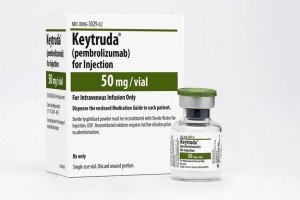Public pressure is growing for the Government to fund the melanoma drug Keytruda, listed as ‘low priority’ by drug funding agency PHARMAC.
 A petition of over 45,000 signatures, calling for the drug to be funded through PHARMAC, is due to be presented to Health Minister Jonathan Coleman on the steps of parliament today.
A petition of over 45,000 signatures, calling for the drug to be funded through PHARMAC, is due to be presented to Health Minister Jonathan Coleman on the steps of parliament today.
Speaking to RNZ this morning Dr Coleman said he would be pushing to increase funding for PHARMAC in the next budget.
The SMC gathered the following expert commentary on the efficacy of Keytruda. Feel free to use these quotes in you reporting. Further comments will be added to the SMC website as they come in.
Dr Francis Hunter, Research Fellow, Auckland Cancer Society Research Centre, University of Auckland, comments:
“The treatment of advanced melanoma in the New Zealand public health system is at least 5 years and 10 clinical trials behind international best practice. While PHARMAC is an effective and appropriate model for deploying the available pharmaceutical resources, its $800m budget is simply too low to provide New Zealanders with access to many of the best cancer medicines.
“Melanoma is the most acute example of this shortfall, where seven modern drugs have been developed but none are funded in New Zealand. The tumour response data for pembrolizumab (Keytruda) are strong enough to warrant provision of temporary access until long-term survival data for Keytruda and its competitor, nivolumab (Opdivo), become available.
“The efficacy of cancer drugs is measured in two ways. One is to evaluate tumour responses, or how many tumours shrink after treatment, which can be determined using CT scans soon after the drug is given. The more definitive test is whether the drug prolongs the life of patients. To collect that information, patients have to be followed over a period of several years.
“With Keytruda, we are waiting for the long-term survival data , but the tumour response data that are available now already suggest the drug to be very effective.”
Read more analysis from Dr Francis on Sciblogs.co.nz.
Prof Tony Blakely, Department of Public Health, University of Otago, Wellington, comments:
“Pembrolizumab (Keytruda) is a potential break through drug for the treatment of melanoma. Early results of trials are very promising. But we do not yet know whether the people who have enjoyed amazing reductions in disease burden will go on to be cured, or the disease will just come back (e.g. the drug works for a while, but then the cancer cells no longer respond).
“Given that a large proportion of people with disseminated melanoma have such a favourable early response, does this long-term data matter? Yes – from the funders perspective. Pembrolizumab is very expensive. If it, say, gives an extra year of life to one third of patients who respond, and it costs $200,000 for a course of therapy, then we (as tax-payers) are paying $600,000 per life year gained. A country like NZ would normally spend up to a maximum of about $50,000 per (quality) adjusted life year gained.
“However, this scenario above is probably pessimistic. If I was a betting man, I would bet that many patients are going to enjoy long-term remission, and possibly even cure. If so, this will make Pembrolizumab cost-effective – even at $200,000 (say) for a treatment. We have undertaken some rapid cost-effectiveness estimates using a calculator from our BODE3 programme, and (making the best assumptions or ‘expert guesses’ we could), it does look like Pembrolizumab is on the cusp of being cost-effective.
“So why doesn’t Pharmac just get on and fund it? Many reasons. But most importantly, because the long-term data is not yet in. This creates a great deal of uncertainty. So, Pharmac is put in the corner here – it has a drug before it that has huge uncertainty about what its long term effect and cost-effectiveness is, but the best guess might be quite good – it is just very uncertain. On the other hand, there are other drugs that have better long term data, and more certainty about effect (and cost effectiveness).
“What about setting up a system whereby Pharmac can provisionally fund a new drug for a year whilst results come in? This is appealing at one level. However, it is not necessarily the best approach. It essentially relieves the pharmaceutical companies of the need to present their data – civil society becomes part of the completion process in trials. This may be a good idea, maybe not. But it is not a tool that Pharmac has before it at the moment. And even if one used this tool (after politicians changed the rules), one is still faced with the above conundrum – something like Pembrolizumab is funded (temporarily) with large uncertainty about its cost-effectiveness, whilst other treatments for other disease with more certainty are not funded.
“At the moment, Pharmac is working within its criteria and process – which has worked extremely well for NZ in the past, in most instances. However, it is up to us – through civil society and our politicians to review these criteria and processes, and level of funding to Pharmac. That is the debate currently happening.”